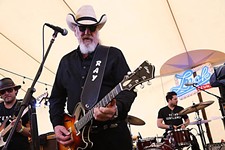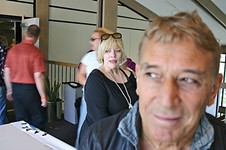Elmore Leonard's World
Writing the Rap
By Ed Ward, Fri., Aug. 18, 1995
Bantam, $22.95 hard
Elmore "Dutch" Leonard is America's preeminent crime novelist, or so the literary establishment, which grants entry to only a few genre practitioners at a time, would have us believe, and frankly, I'm not going to quibble. A master of the double cross, a writer whose ear for the way people speak is justifiably lauded, and a man whose eye for detail subtly adds verisimilitude to his ostensibly disposable fiction, Leonard has worked his way up to the best-seller lists with each new book, a feat that few of his equally talented competitors (I'm thinking specifically of James Lee Burke) can equal.
This being the case, then, we have to ask an uncomfortable question: Who wrote Riding the Rap? I know it's got his name on it, but.... The plot is intricate, okay, but that's hardly unique in this genre. U.S. Marshal Raylan Givens' girlfriend, Joyce, is worried about Harry Arno, the other man in her life, a semi-retired bookie who drinks too much and seems to have disappeared, and she wants Givens to find him. Harry has, in fact, disappeared: He's been kidnapped. This has come about because he had hired Bobby Deogracias, a slimy Puerto Rican bounty-hunter, to collect a large gambling debt owed by Warren "Chip" Ganz III, a guy in his mid-fifties who's spent his whole life living off of his mother's money and gambling it away.
What Bobby didn't know was that Chip and his "caretaker," a Bahamian ex-con named Louis Lewis, had decided to get rich quick by taking hostages, kidnapping wealthy men and holding them until they decide to hand over their money to them. They hadn't quite settled on a first victim when Bobby walked in. Louis recognized Bobby from prison, and immediately knew that he'd go for the plan. So Bobby threw in with Chip and Louis, and lured Harry away from his country club with the help of a psychic reader, the Reverend Dawn Navarro. After a quick reading of his cards, she invited him back to her place for a further reading and hypnotised him into revealing the location of his off-shore bank-account, which, handily, is in Freeport, Bahamas. Then Bobby and Louis swept in, silently, and took him off to Chip's secluded mansion.
Givens has little problem picking up Harry's trail: He's a man of habit, and the waiter at the country club mentions that he'd gone off with the reader. He takes one of her cards and goes to visit her. There, he gets a surprise: She really is psychic and tells him plenty about his past without his feeding her any clues. She admits seeing Harry, but only at the country club, and Givens realizes she's lying. Joyce, meanwhile, has gone through an address book of Harry's, and has come upon Chip Ganz's name and concluded he must be the guy Harry was trying to collect from when he disappeared.
Thus begins the cat-and-mouse game, with the imperturbable Givens just waiting for the crooks to fuck up so he can nail them. Which, of course, they eventually do and he eventually does. It all goes like clockwork, and that's the problem: It's rather like watching a cuckoo clock waiting for the bird to come out. You just know that when the big hand reaches 12, there he'll be. The book is mechanical in a decidedly un-Leonardish fashion, and this is mostly down to the character - or, rather, the characterlessness - of Givens. Unlike most classic Leonard characters, he's immune to temptation, straight as the proverbial arrow, and he plods along recovering Harry while the more interesting crooks bicker and betray and roll around like the loose cannons they are. Mind you, Leonard's crooks are always interesting, but these guys, like Givens, also seem like cookie-cutter figures.
I was so disturbed by Riding the Rap (it's symptomatic that the title
comes from a peripheral conversation at the beginning of the book that seems
inserted so that the title would figure in the damn thing somewhere) that I
remedied a gap in my knowledge and picked up Leonard's last three books. As I'd
been warned, they're not as good as his
classic work, but they're certainly
competent at worst. Riding the Rap isn't: It's boring.
Even when
he's spinning his wheels, Elmore Leonard isn't boring.
So I'm back to my question: Who wrote this book? Maybe we'll have to wait 'til the post-publication publicity tour and see if Dutch makes it to the talk shows, because I've got a theory - Annie Liebovitz's photo of him on the back could easily be of a corpse, propped up in a chair. There's no life in it at all. Maybe Leonard died sometime during the writing of Riding the Rap and it was finished by a computer programmed with his style or a graduate student writing a thesis on him or something. Maybe his estate owes the Bad Guys some gambling debts or something, or he was murdered and the continuing production of novels under his name serves to disguise this nefarious deed. Annie zipped down to Florida to shoot the picture before he started decomposing and....
Hell, even my theory is more interesting than this thing. Avoid. Sorry. n








